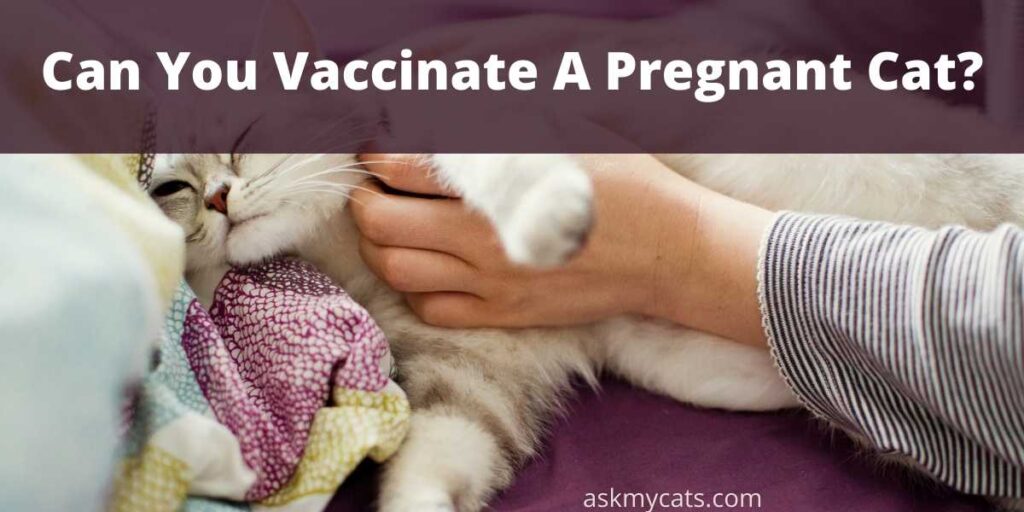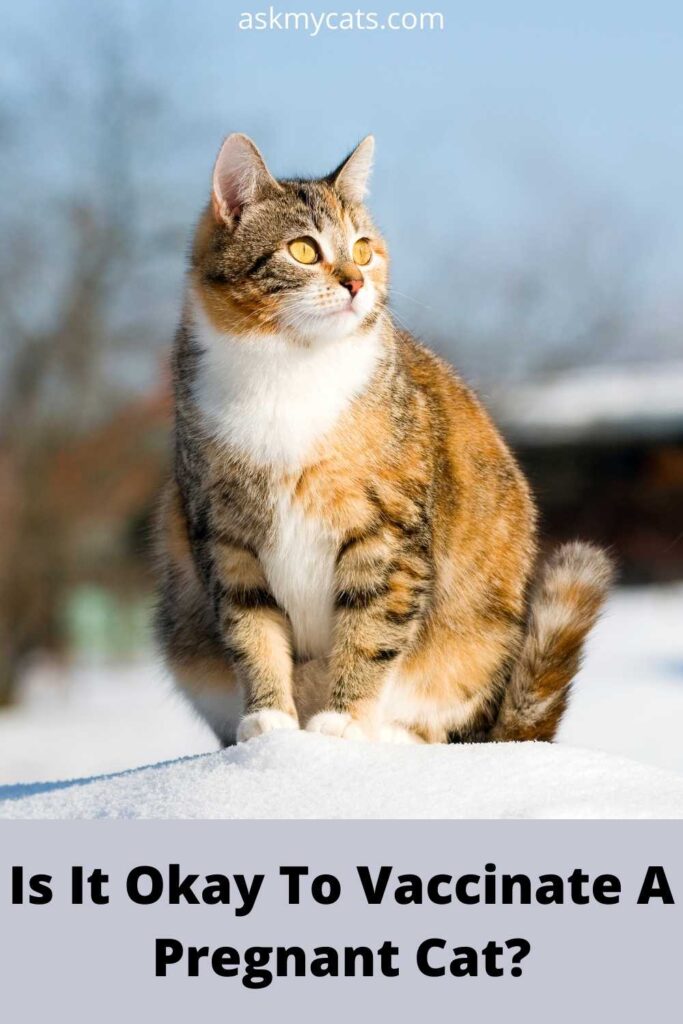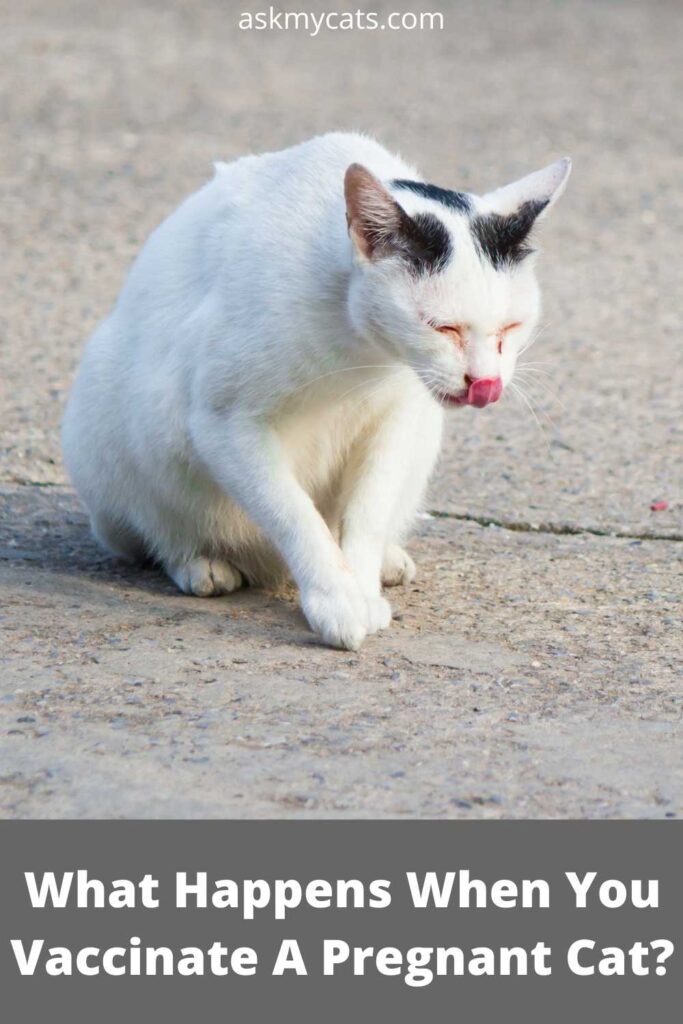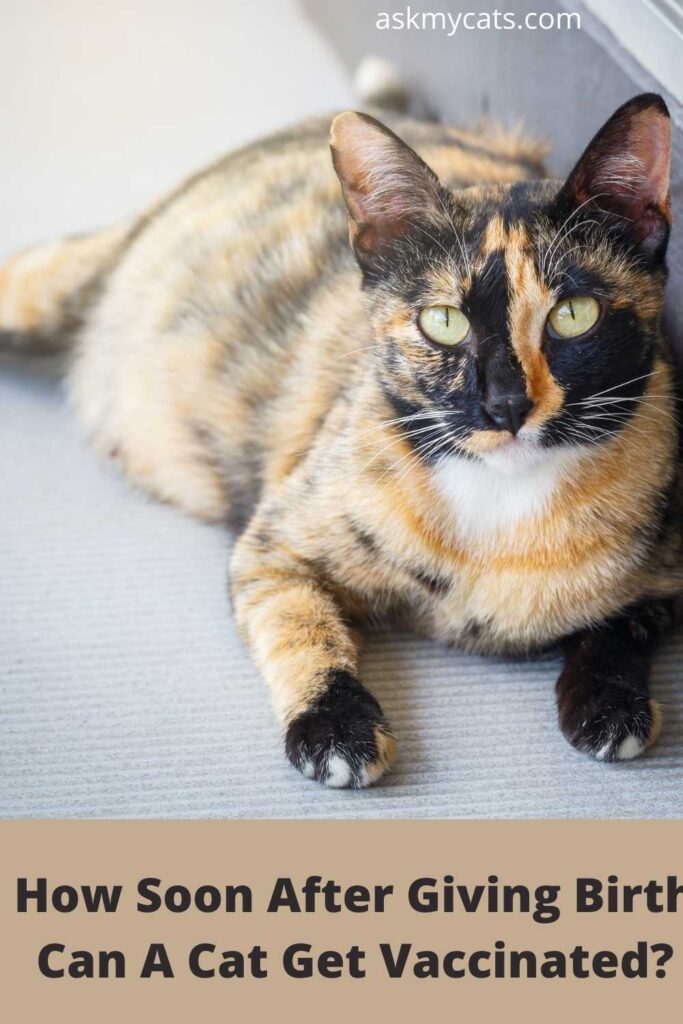Is your furball pregnant but her vaccination doses are still pending? Are you confused if getting her vaccinated now would be the right thing or not?
I have nurtured 3 cats myself, so I think I am a qualified source for your answers.
Don’t worry; this article will clear up any of your questions about pregnant cats and their vaccinations, including which ones are safe to administer now and when to administer the next dosage if necessary.
Let’s get into it.


Give Your Cat the Perfect Day
Get the Free Ebook!
Is It Okay To Vaccinate A Pregnant Cat?

You should try NOT to vaccinate a pregnant cat.
Your queen should be alright if her immunizations have been kept up to date and were current prior to becoming pregnant.
If she hasn’t received a vaccination, you should hold off until after the kittens have been born.
What Are The Complications Of Vaccinating A Pregnant Cat?
Vaccines are very crucial for a cat’s development. However, when she is bearing children, it comes with some complications.
They are:
- MLV FVRCP vaccination during pregnancy in cats can result in congenital abnormalities or abortion. Whether or not to vaccinate pregnant cats must be weighed against the risk of panleukopenia (a viral disease) in the shelter.
- If given intranasally, the MLV FVRCP vaccine may result in a dangerous upper respiratory infection. It may even do so if a cat licks up spilled medication. Avoid putting the vaccine in front of the cat’s nose, and clean any vaccine that spills on the fur with alcohol right away.
- Within five to twelve days of receiving the MLV vaccine, a mild false-positive parvo SNAP test result may occur.
The adverse effects of vaccinating a pregnant feline are:
- Lethargy with or without fever
- Injection site pain or even swelling
- Vomiting
- Diarrhea
- Facial edema
- Pruritus (itching)
- Collapse
What Happens When You Vaccinate A Pregnant Cat?

It is never advised to vaccinate a pregnant animal. Immunizations with modified live viruses should never be delivered. If necessary, vaccines against viruses like rabies may be administered later in pregnancy, but only with your veterinarian’s counsel and supervision.
At the very least, there is a high chance that vaccinating your pregnant cat, knowing or unknowingly, will kill her babies or they’ll be born with abnormalities.
Here’s what happens exactly after vaccinating a pregnant feline:
Inflammation of any kind during pregnancy, especially in the first half, has been proven to reduce the number of embryos that survive to term.
Inflammation can disrupt the placenta or stop implantation, which results in the failure or death of the embryo. The most crucial days are days 18 to 25, but inflammation can be problematic at any point in the first 30 days.
Because it is unlikely to benefit the litter she is carrying, vaccinating a mother while she is pregnant offers little medical benefit.
Breeders frequently seek treatment to support colostrum antibodies.
There is no good reason to vaccinate your pregnant fluffball at the end of the procedure if you are not willing to do so at the beginning of the process to prevent child loss. This only increases her chances of embryo loss by the loss of the term.
Come on, what else is there to even think about? After giving birth, take time to complete your baby’s vaccines.
What Vaccines Can A Pregnant Cat Have?
It is not advisable to vaccinate a pregnant cat unless and until it is absolutely necessary.
Killer vaccines are preferred for use in FeLV or FIV-infected cats, especially those displaying signs of immunosuppression, and in pregnant cats only if absolutely necessary.
The majority of vaccinations aim to promote immunity to viruses. The disease is brought on by viruses that infiltrate the body’s cells. The virus’s DNA or RNA replaces the function of the cell’s DNA, and it uses the cell’s machinery to create more viruses.
The newly formed virus is released during cell explosions, where it grows inside the cell and spreads to many additional cells. At the same time, the body’s white blood cell surveillance mechanism identifies virus-infected cells.
The same function is served by killed vaccines, but there is no risk of disease actually developing.
Can I Vaccinate My Cat After Giving Birth?
Yes! You can vaccinate your queen after she has given birth.
Since there are no known risks to nursing babies, it is advised to vaccinate cats after delivery.
At 4-6 weeks old, kittens can start their subcutaneous vaccination series, and the newborns are not at any risk when their nursing mothers receive vaccinations.
The ideal age to vaccinate any cat is:
Around eight weeks old is when kittens should get their first shots.
They should have been weaned by this time, and any immunity Kitty’s milk may have given them would now be disappearing. At 12 and 16 weeks, the kittens will need booster doses, spaced four weeks apart.
The vaccination plan for your furbaby will be based on her lifestyle and medical history. She might choose to wait for her injections till the kittens are weaned, even though there is no hard and fast rule about whether to vaccinate after she has given birth.
To decide when to vaccinate her, you should talk with your veterinarian about her vaccine needs.
Interesting Read: When Can My Cat Go Outside After Giving Birth?
How Soon After Giving Birth Can A Cat Get Vaccinated?

A cat can immediately get vaccinated after giving birth since nursing kittens don’t pose any threat to the mother cat.
Any indoor cat who is pregnant should get the following shots, either before or after pregnancy.
Panleukopenia
Fever, vomiting, diarrhea, appetite loss, and, in some cases, abrupt death are all symptoms of this dangerous and highly contagious virus. Kittens are especially vulnerable.
Feline herpesvirus
Conjunctivitis, inflammation of the mucous membranes around the eyes, keratitis, fever, sneezing, eye and nasal discharge, and fatigue are all symptoms of an upper respiratory infection brought on by this virus.
Again, kittens are more likely to get an infection.
Calicivirus
This extremely contagious virus is one of the main causes of upper respiratory infections in cats.
Sneezing, eye and nasal discharge, conjunctivitis, lethargy, appetite loss, ulcers on the gums and soft tissues of the oral cavity, and lameness are all possible symptoms in affected cats.
Affected kittens may occasionally get pneumonia.
Feline Leukemia Virus
FeLV is the main cause of virus-related mortality in cats and is transferred by infected cats’ saliva, nasal secretions, feces, urine, and milk. It can spread through casual contact, bite wounds, and lactation.
Cats with the infection may develop cancer, immune system dysfunction, and anemia. The FeLV vaccination is regarded as a mandatory shot for all kittens under the age of one.
Rabies
The most common way for this viral infection to spread is through bite wounds, but it can also be introduced to any mammal by exposing an open wound to an infected animal’s saliva. If an infected animal bites a human, it may get infected as well.
Is It Okay To Vaccinate A Nursing Cat?
Nursing or lactating cats have no problems if vaccinated. Once she had given birth, most of the critical situation was over.
The main risk of vaccinating a pregnant cat is the abnormalities that her kittens are subjected to, but after labor, that thing is over.
Lactation is not a reason for concern, and immunization during this phase can be done as usual.
Frequently Asked Questions
When a cat becomes pregnant after receiving her first round of vaccinations but still needs her second round, what should you do?
A veterinarian should assist her in having the litter as soon as possible.
Every time a mature queen mates, she becomes pregnant. It follows that there is little to no time between having a litter and getting pregnant again. Therefore, confine her to the house until the kittens are born and then until you can get her fixed and vaccinated.
Sending the kittens to loving homes or rescue organizations helps to prevent them from being unaltered and being able to reproduce additional unwanted cats that will only be put to death, abandoned, or used as bait to train canines to fight.
By having your cat fixed, you may help reduce the number of unwanted cats. By doing this, kitten overpopulation is avoided.
Can a newly adopted, 8-month-old kitten that has never received vaccinations get them now?
Take your cat to the vet so she can receive a one-year rabies vaccination.
She will also require FVRCP, a combo vaccine that protects against a number of diseases. FeLV is also present and helps prevent feline leukemia. A series of the FVRCP and FeLV vaccinations are administered.
You’ll learn from your veterinarian when to expect these very vital vaccinations. Before adopting an animal, reputable rescues ensure that it has received the necessary vaccinations for its age.
Final Words
That is it about felines, their pregnancy, and the vaccinations.
Hopefully, you’ll now be having fewer panic attacks when it comes to these. Hopefully, you’ll no longer experience panic attacks when thinking about these.
Tell us in the comments if your cat has received all of the recommended vaccinations. How old is she? Did she birth a litter?
